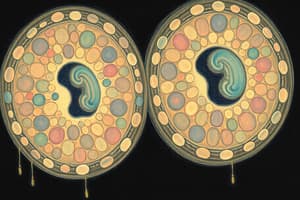Podcast
Questions and Answers
During which stage of interphase does DNA replication occur?
During which stage of interphase does DNA replication occur?
What occurs during the metaphase stage of mitosis?
What occurs during the metaphase stage of mitosis?
What is the end result of meiosis?
What is the end result of meiosis?
What occurs during cytokinesis in animal cells?
What occurs during cytokinesis in animal cells?
Signup and view all the answers
What is the process by which cells communicate with each other?
What is the process by which cells communicate with each other?
Signup and view all the answers
During which stage of mitosis do chromosomes uncoil and return to interphase structure?
During which stage of mitosis do chromosomes uncoil and return to interphase structure?
Signup and view all the answers
What is the purpose of the S stage in interphase?
What is the purpose of the S stage in interphase?
Signup and view all the answers
What is an example of a cell signaling molecule?
What is an example of a cell signaling molecule?
Signup and view all the answers
Study Notes
Cell Cycle and Cell Division
Interphase
- Period of cell growth and preparation for cell division
- Consists of three stages: Gap 1 (G1), Synthesis (S), and Gap 2 (G2)
- G1: Cell growth, organelle duplication, and preparation for DNA replication
- S: DNA replication, resulting in two identical copies of DNA
- G2: Preparation for cell division, including spindle fiber formation and organelle distribution
Mitosis
- Type of cell division that results in two daughter cells with the same number of chromosomes as the parent cell
- Consists of four stages: Prophase, Metaphase, Anaphase, and Telophase
- Prophase:
- Chromatin condenses into visible chromosomes
- Nuclear envelope breaks down
- Spindle fibers form
- Metaphase:
- Chromosomes line up at the center of the cell
- Each chromosome is attached to a spindle fiber
- Anaphase:
- Sister chromatids separate and move to opposite poles
- Chromosomes are pulled apart by spindle fibers
- Telophase:
- Nuclear envelope reforms
- Chromosomes uncoil and return to interphase structure
Meiosis
- Type of cell division that results in four daughter cells with half the number of chromosomes as the parent cell
- Occurs in gamete production (sperm and egg cells)
- Consists of two consecutive cell divisions: Meiosis I and Meiosis II
- Meiosis I:
- Homologous chromosomes pair up and exchange genetic material
- Sister chromatids separate and move to opposite poles
- Meiosis II:
- Sister chromatids separate and move to opposite poles
- Four haploid daughter cells are produced
Cytokinesis
- Process of cytoplasmic division and cleavage of the cell
- Occurs after mitosis or meiosis
- In animal cells:
- Cleavage furrow forms and deepens
- Cell splits into two daughter cells
- In plant cells:
- Cell plate forms and separates the cytoplasm
- Cell wall material is deposited in the cell plate
Cell Signaling
- Process by which cells communicate with each other to regulate cell division and growth
- Involves signal transduction pathways and molecular signaling molecules
- Examples of cell signaling molecules:
- Growth factors
- Hormones
- Cytokines
- Signaling proteins (e.g. cyclin-dependent kinases)
Cell Cycle and Cell Division
Interphase
- Lasts for 90% of the cell cycle, involving cell growth and preparation for cell division
- Comprises three stages: Gap 1 (G1), Synthesis (S), and Gap 2 (G2)
- G1: Cell growth, organelle duplication, and preparation for DNA replication
- S: DNA replication, resulting in two identical copies of DNA
- G2: Preparation for cell division, including spindle fiber formation and organelle distribution
Mitosis
- Type of cell division resulting in two daughter cells with the same number of chromosomes as the parent cell
- Consists of four stages: Prophase, Metaphase, Anaphase, and Telophase
- Prophase: Chromatin condenses into visible chromosomes, nuclear envelope breaks down, and spindle fibers form
- Metaphase: Chromosomes line up at the center of the cell, each attached to a spindle fiber
- Anaphase: Sister chromatids separate and move to opposite poles, chromosomes are pulled apart by spindle fibers
- Telophase: Nuclear envelope reforms, chromosomes uncoil, and return to interphase structure
Meiosis
- Type of cell division resulting in four daughter cells with half the number of chromosomes as the parent cell
- Occurs in gamete production (sperm and egg cells)
- Consists of two consecutive cell divisions: Meiosis I and Meiosis II
- Meiosis I: Homologous chromosomes pair up and exchange genetic material, sister chromatids separate and move to opposite poles
- Meiosis II: Sister chromatids separate and move to opposite poles, four haploid daughter cells are produced
Cytokinesis
- Process of cytoplasmic division and cleavage of the cell
- Occurs after mitosis or meiosis
- In animal cells: Cleavage furrow forms and deepens, cell splits into two daughter cells
- In plant cells: Cell plate forms and separates the cytoplasm, cell wall material is deposited in the cell plate
Cell Signaling
- Process by which cells communicate with each other to regulate cell division and growth
- Involves signal transduction pathways and molecular signaling molecules
- Examples of cell signaling molecules: Growth factors, hormones, cytokines, and signaling proteins (e.g. cyclin-dependent kinases)
Studying That Suits You
Use AI to generate personalized quizzes and flashcards to suit your learning preferences.
Description
Test your knowledge of the cell cycle, including interphase and mitosis, and learn about the different stages of cell growth and division.



